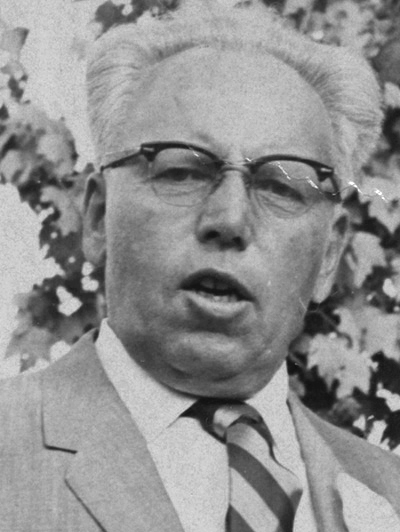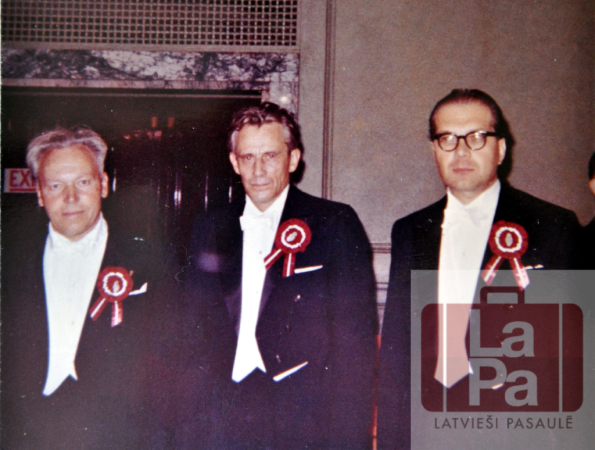Arnolds Kalnājs
1906-1975
Organist, composer, director, publisher
Arnolds Kalnajs (né Berkholcs) was born on 13 September 1906 in Lejasubeles, Vaives parish, the eighth of ten children. He studied at Vaive parish school, then at Araisi parish school where he learned the basics of organ and piano playing with O. Zarins ( O. Zariņš). He continued his studies at Berzaine Gymnasium in Cesis and Cesis Music School. Between 1927 and 1932 he studied at the Latvian Conservatoire in the organ class of Peteris Pauls Jozuuss (Pēteris Pauls Jozuuss) and in the composition theory class of Jazeps Vitols (Jāzeps Vītols) and Adolfs Abele (Ādolfs Ābele).
After graduation he was an organist at St. John's Church in Cesis, leading the choirs of the Cesis parish, the 10th Cesis Guard Regiment and the Raiskums Forestry Men's Choir. He wrote his first composition, the song “Baltās smiltis” (White Sands) in 1932. It was dedicated to the author of the lyrics E. Treimanis. A few years later he submitted his song "Jaunais rīts" (New Morning) with lyrics by Aina Abele to the 9th Latvian Song Festival where he won 2nd prize. Between 1932 and 1940 he was a teacher of organ and piano classes at the Cesis Teachers' Institute.
A change of surname shortly before the occupation of Latvia in 1940 saved Kalnajs and his family from deportation. That year, he married the choir singer Alma Sietina (Alma Sietiņa), and the family grew with two daughters and a son. Due to his escape, he lost his job and moved to Smiltene where he got a job as a teacher at a gymnasium. Already in 1941, after the first Russian occupation, he returned to Cesis and worked as a music school director and singing teacher at the Cesis Secondary School until 1944.
In 1944, when he and his family fled to Germany, he took with him the sheet music of Latvian choirs. It was useful in the founding of mixed choir "Dziesmu vairogs" in the Nuremberg refugee camp with 90 singers in 1945. As early as 1946, Latvians in exile organised the first song days in Germany. Kalnajs initiated the idea of the exile song festivals, and he the main organiser and the chief conductor of all five song days of the Franconian region (in 1946) and the 75th commemorative song day of the I Latvian Song Festival in Fischbach (in 1948). In 1949, Kalnajs moved from Europe to Kalamazoo in the USA. His choir followed him and he led it until his passing. He was the principal conductor of the first five Song Festivals in North America from 1953 to 1973.
Kalnajs served on the editorial board of the publication “Latvju Muzika”. He has composed a cantata for male choir and symphony orchestra, piano works, two works for organ, folk song settings for choirs, and more than 40 original songs. Among the most famous: "Pie Daugavas" (At Daugava, 1945); "Upe nesa ozoliņu" (The River Brought an Oak Tree, 1945); "Dainu zemei" (To the Land of Song, 1960); "Dziesmai nerimstot" (Song Doesn’t Cease, 1970); "Pūti, pūti, zilais vējš" (Blow, blow, blue wind, 1966); cantata for men’s choir with symphony orchestra "Trauksme 18. novembra naktī" (Alarm on the Night of 18 November, 1970), lyrics by Marta Grimma.
Kalnajs passed away on 22 March 1975. He is buried in Riverside Cemetery, Kalamazoo, a few steps behind the grave of his teacher, Professor Adolfs Abele (Ādolfs Ābele).
We kindly invite to visit the Jāzeps Vītols Memorial Room of the Jāzeps Vītols Latvian Academy of Music, where various documents about Arnolds Kalnājs are kept. More information: https://www.jvlma.lv/en/research/jazeps-vitols-memorial-room
Information sources
Arnolds Kalnājs (Berkholcs). (b.g.). https://www.lmic.lv/lv/muziki/arnolds–kalnajs–berkholcs–1553#album
Arnolds Kalnājs atmiņu pēdās. (1978, 1. janvāris). Latvju Mūzika, 10, 885.–895. Latvju Mūzika, Nr.10 (01.01.1978) (periodika.lv)
Arnolds Kalnājs. (b.g.). https://www.latviansongfestfund.com/arnolds–kalnajs/




